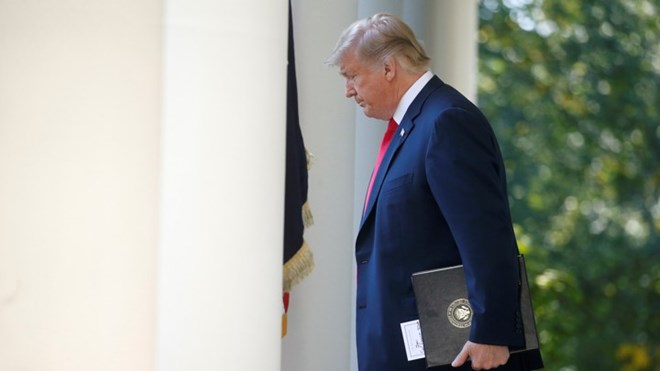
Tuesday October 2, 2018
KRISHNADEV CALAMUR

It’s well known by now that President Donald Trump isn’t particularly popular in Europe: He has withdrawn from the Paris climate accord and the nuclear pact with Iran, imposed punitive tariffs on steel and aluminum imports from the European Union, and questioned nato’s usefulness. For a bloc that functions (or doesn’t, if you ask its critics) through unanimity and consensus building, Trump is a shock to the global system that the United States created in the aftermath of World War II. But a new survey from the Pew Research Center released Monday shows not just how unpopular Trump himself is, but also how the extent of that unpopularity is bleeding into how Europeans view the United States as a whole.
Seven in 10 people around the world have no confidence in Trump, according to the survey of 26,112 people in 25 countries carried out from May 20 to August 12. The figures in European countries are far worse for Trump. In Germany, 10 percent said they have confidence in him; in France the figure is even lower: 9 percent, according to the survey. Strikingly, 43 percent of respondents said they had an unfavorable view of the U.S.; 50 percent said they had a favorable view.
“We’ve seen a big shift in America’s image around the world from the Obama to Trump presidencies,” Richard Wike, the director of Pew’s Global Attitudes Research, told me. There are “lower ratings for the U.S. in many countries; and … in the vast majority of countries we surveyed, [there are] much more negative views about Trump than we found about Obama when he was in the White House.” Obama was widely liked in Europe, though his approval did suffer in the wake of revelations that the U.S. had been spying on its allies in Germany and other places, as well as his administration’s aggressive use of drones in counterterrorism efforts in the Middle East.
The Pew survey comes at a critical juncture in American history: Trump is nearing the second anniversary of his presidential election, the U.S. is preparing for a midterm election, and the nation is watching a bitter fight over the president’s nomination of Brett Kavanaugh to the U.S. Supreme Court. One could argue that such contentiousness is a historical feature of American politics, but the Pew survey did not ask respondents this year what they thought of American democracy; this question has received mixed reactions in past years.
Trump’s approval in Europe is comparable to the figures seen for President George W. Bush toward the end of his second term. What’s different, however, as Wike wrote in The Atlantic in May, is that America’s previous unpopularity came from what its critics viewed as overreach in Iraq. The disapproval in the Trump years stems from the U.S. disengaging, in its critics’ view, from the rest of the world. Indeed, the latest Pew survey bears that thesis out: 37 percent of respondents said the U.S. was less involved in the world compared to past years, 34 percent said the U.S. involvement was about the same, and about 14 percent said the U.S. had increased its global role.
To be sure, there have always been strains of anti-Americanism among certain European elites, especially over U.S. involvement in Vietnam, Iraq, and the global war on terrorism, but Wike said that “attitudes about American foreign policy didn’t have a big impact about what European [citizens] are thinking about the United States.”
“The U.S. still has a lot of soft power in Europe and other parts of the world ... But when you look at American policies, attitudes toward the American president, those are right now very negative in Europe,” he said. “It’s those things that are driving down the overall ratings for the United States in Europe.”
Indeed, Trump is viewed with less confidence than German Chancellor Angela Merkel (52 percent confidence), French President Emmanuel Macron (46 percent), Chinese President Xi Jinping (34 percent), and Russian President Vladimir Putin (30 percent). Additionally, when Trump does find support in Europe, it is often from supporters of radical-right parties in the U.K., Sweden, France, Italy, the Netherlands, and Germany, who are more likely to view him favorably than their compatriots.
Still, the world’s views about the U.S., or indeed its president, don’t mean that the alternatives to U.S. power are particularly attractive. When asked if it would be better for the world to have the U.S. or China as the leading power, 63 percent said the U.S.; 19 percent wanted China. Support for the U.S. was particularly high in Asian countries (73 percent) and in western Europe (64 percent). Or to put it another way: The world may not like Trump or the direction the U.S. is headed in, but the alternatives look worse.